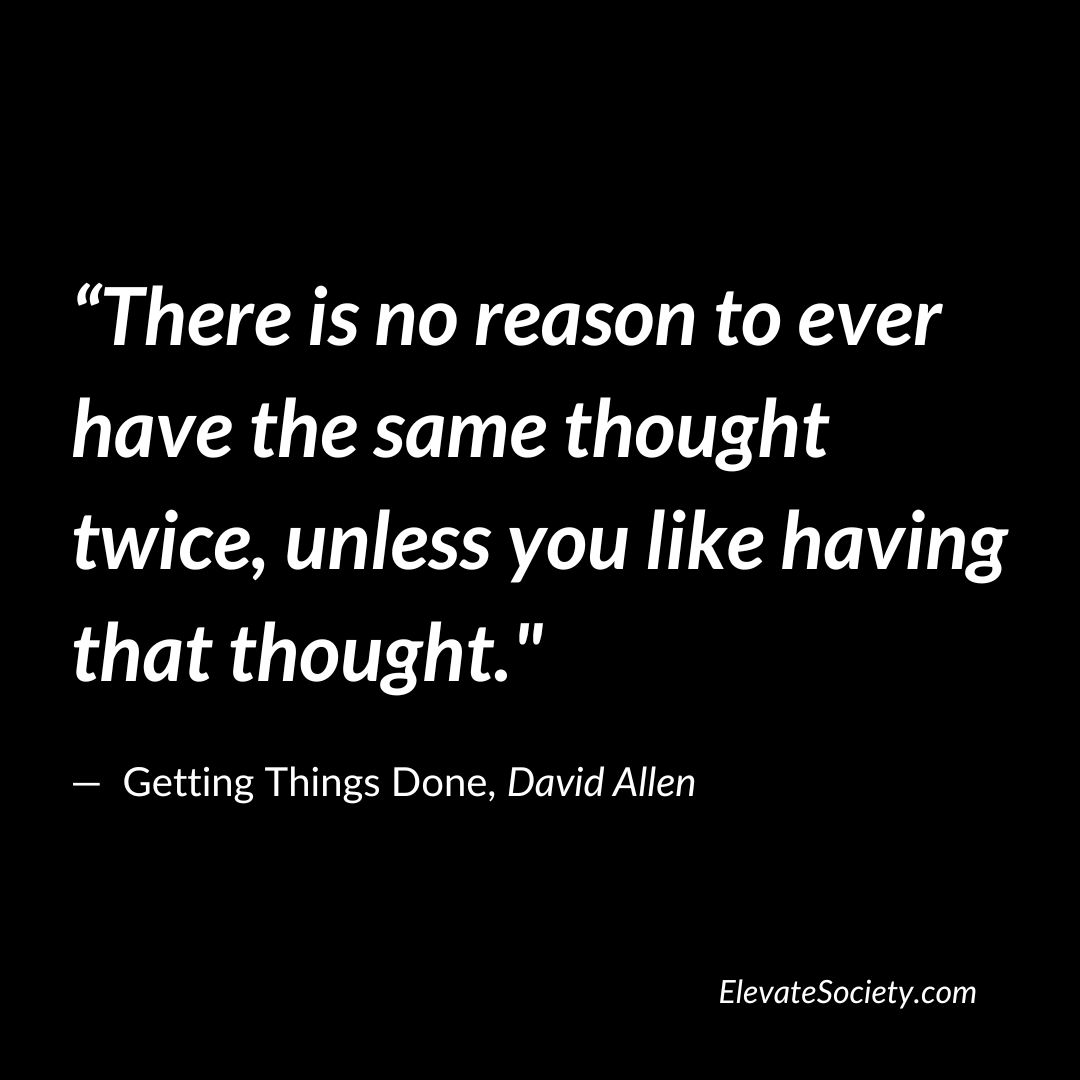There is no reason to ever have the same thought twice, unless you like having that thought.
What's the meaning of this quote?
Quote Meaning: The quote highlights the power of our thoughts and our ability to choose what we think. It reminds us that we have the power to control our thoughts and that we don't have to think the same negative or unproductive thoughts repeatedly. We have the ability to choose our thoughts and focus on positive, constructive ones instead. This quote is a reminder that we have the power to shape our thinking and that we can choose to think in a way that supports our goals and well-being.

Who said the quote?
The quote "There is no reason to ever have the same thought twice, unless you like having that thought." was said in the book Getting Things Done (Summary / Quotes) by David Allen. David Allen is a productivity consultant and the author of the bestselling book "Getting Things Done," which outlines a system for improving personal productivity and reducing stress.
What's the quote's message?
The quote is a thought-provoking statement that encourages individuals to embrace the power of their thoughts and question why they choose to think certain thoughts repeatedly.
At its core, this quote is about the importance of self-awareness and the ability to manage one's thought patterns. It suggests that individuals have the power to choose what they think about, and that repetition is only necessary if it serves a purpose.
Repeating thoughts can be beneficial in certain situations. However, if you find yourself constantly thinking negative thoughts or ruminating on past events, it may be time to reassess why you are having these thoughts...
The quote also highlights the idea that our thoughts shape our reality. If we consistently think negative thoughts we are more likely to experience negative outcomes. Conversely, if we focus on positive thoughts and experiences we are more likely to attract positive experiences into our lives.
Therefore, it's important to be mindful of our thoughts and choose them wisely. We can train ourselves to redirect our thoughts when they are not serving us and actively seek out new and positive thought patterns.
Is there a historical example that illustrates the message of the quote?
One common interpretation of this quite is that we have control over our thoughts, and if a thought isn't productive or enjoyable, we shouldn't waste our time dwelling on it. This sentiment can be seen in the life of Thomas Edison.
Edison, an inventor with 1,093 patents to his name, was a man known for his relentless inventiveness and optimism. He held an enduring belief in experimentation and learning from failure. He notably said, "I have not failed. I've just found 10,000 ways that won't work." This illustrates the point of not getting stuck on the same negative thought (in this case, viewing a setback as a failure). Instead, he chose to frame the thought differently, turning it into a positive learning experience. This aligns with the quote, as he chose to have thoughts that were useful and forward-thinking.
On the flip side, his intense focus on his inventions likely meant he indulged in thoughts he enjoyed having - that of discovery, innovation, and the next breakthrough. However, this quote can also be applied to many historical figures who showed resilience, optimism, and the ability to adapt their thinking to overcome adversity.
* Check my quotes page, where I delve into the messages behind some of the most thought-provoking quotes.
Chief Editor
 Tal Gur is an author, founder, and impact-driven entrepreneur at heart. After trading his daily grind for a life of his own daring design, he spent a decade pursuing 100 major life goals around the globe. His journey and most recent book, The Art of Fully Living, has led him to found Elevate Society.
Tal Gur is an author, founder, and impact-driven entrepreneur at heart. After trading his daily grind for a life of his own daring design, he spent a decade pursuing 100 major life goals around the globe. His journey and most recent book, The Art of Fully Living, has led him to found Elevate Society.



















